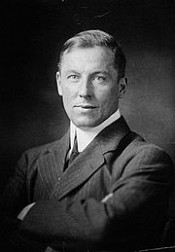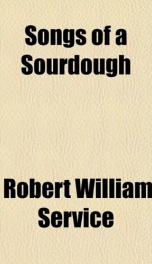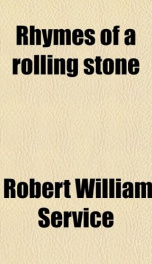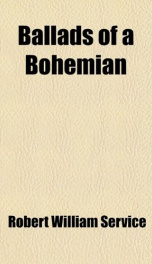Robert William Service (January 16, 1874 – September 11, 1958) was a poet and writer, sometimes referred to as "the Bard of the Yukon".[1][2] He is best-known for his writings on the Canadian North, including the poems "The Shooting of Dan McGrew", "The Law of the Yukon", and "The Cremation of Sam McGee". His writing was so expressive that his readers took him for a hard-bitten old Klondike prospector, not the later-arriving bank clerk he actually was. In addition to his Yukon works, Service also wrote poetry set in locales as diverse as South Africa, Afghanistan, and New Zealand. His writing has a decidedly British Empire point of view. Service was born into a Scottish family while they were living in Preston, England. He was schooled in Scotland, attending Hillhead High School in Glasgow. He moved to Canada at the age of 21 when he gave up his job working in a Glasgow bank, and travelled to Vancouver Island, British Columbia with his Buffalo Bill outfit and dreams of becoming a cowboy. He drifted around western North America, taking and quitting a series of jobs. Hired by the Canadian Bank of Commerce, he worked in a number of its branches before being posted to the branch in Whitehorse (not Dawson) in the Yukon Territory in 1904, six years after the Klondike Gold Rush.[3] Inspired by the vast beauty of the Yukon wilderness, Service began writing poetry about the things he saw. Conversations with locals led him to write about things he hadn't seen, many of which hadn't actually happened, as well.[4] He did not set foot in Dawson City until 1908, arriving in the Klondike ten years after the Gold Rush,[5] but his renown as a writer was already established. Service became known for his work about the West and the Yukon gold miners. Such works as "The Shooting of Dan McGrew" and "The Cremation of Sam McGee" made him famous around the world. After having collected enough poems for a book, Service offered a publisher $100 of his own money to publish the work, but the publisher was so sure that the works would be popular (he had already taken 1700 offers for sale off the galley proofs), he returned Service's money and offered him a contract. The book was published in 1907 in North America as The Spell of the Yukon and Other Verses and in England as The Songs of a Sourdough. This made Service wealthy and he became known as the "Canadian Kipling". Within two years he was able to quit his job at the bank, and to travel to Paris, the French Riviera, Hollywood, and beyond. During his time in Paris he was reputedly the wealthiest author living in the city, yet was known to dress as a working man and walk the streets, blending in and observing everything around him. From 1912 to 1913 he was a correspondent for the Toronto Star during the Balkan Wars. Service served during World War I; he was a British subject, and worked as an ambulance driver for the Canadian Red Cross, as well as working as a war correspondent for the Canadian government. He wrote a number of poems about the war, many appearing in a new book, The Rhymes of a Red-Cross Man, in 1916. Some of these, along with his earlier "The March of the Dead" about the Boer War, were put to music and compiled into the anti-war album War, War, War by "Country" Joe McDonald in 1971. Many of Service's poems celebrated duty to country in war, and although he often pointed out the sacrifice of the common soldier in war, he could not be considered an "anti-war" writer. His brother, Lieutenant Albert Service, Canadian Infantry, was killed in action in France in August 1916. [6] Service is also noted for his use of ethnonyms that would normally be considered offensive "slurs", but with no insult apparently intended. Words used in Service's poetry include jerries (Germans), dago (Italian), pickaninny (in reference to a Mozambican infant), cheechako (newcomer to the Yukon and Alaska gold fields, usually from the U.S.), nigger (African-American), squaw (Aboriginal woman), and Jap (Japanese). Service married Germaine Bougeoin, a Parisian, and they purchased a summer home in the Brittany region of France. Thirteen years younger, she lived 31 years following Service's death, dying at age 102 in 1989. At the outbreak of World War II, Service was present during the German invasion of Poland. He fled the country, returning to North America. He remained in Hollywood until the war's end. He then returned to his home in Brittany, where he lived until his death in 1958, though he wintered in Monte Carlo and the French Riviera. Throughout all this, Service remained a British subject and carried a British passport. Service wrote two volumes of autobiography - Ploughman of the Moon and Harper of Heaven. He died in Lancieux, Côtes-d'Armor, in Brittany, and is buried there in the local cemetery. Robert Service lived between 1909 and 1912 in a log cabin on 8th Avenue in Dawson City, Yukon. His relative prosperity allowed him the luxury of a telephone. After he left for Europe, the Imperial Order of the Daughters of the Empire (I.O.D.E.) took care of the house until 1971, preserving it. Service eventually decided he could not return to Dawson, as it would not be as he remembered it. In 1971, the Service cabin was taken over by Parks Canada, which maintains it, including its sod roof, as a tourist attraction. Irish-born actor Tom Byrne created The Robert Service Show which was presented in the front yard of the cabin, starting in 1976. This was very popular for summer visitors and set the standard for Robert Service recitations. A resurgence in sales of Service's works followed the institution of these performances. Mr. Byrne discontinued the show at the cabin in 1995, moving it to a Front Street storefront. Since 2004 the show has been held at the Westmark Hotel in Dawson City at 3:00 p.m. every day during the summer months. Mr. Byrne is a collector of Robert Service first editions, and corresponded with Mr. Service's widow for many years prior to her death. Local Dawson entertainers dressed in period costume and employed by Parks Canada offer biographical information and recite Service's poetry for visitors sitting on benches on the front lawn. Johnny Nunan performed this role through 2006. The present performer shares his first name (Fred). Following the presentation, visitors can view Service's home through the windows and front door. The fragility of the house, and the rarity of the artifacts, precludes any possibility of allowing visitors to enter the house itself. Robert W. Service has been honoured with schools named for him including Service High School in Anchorage, Alaska, Robert Service Middle School in Toronto, Ontario[7] and Robert Service School in Dawson City, Yukon.[8] He was also honoured on a Canadian postage stamp in 1976. The Robert Service Way, a main road in Whitehorse, is named after him. Additionally, the Bard & Banker public house in Victoria, British Columbia is dedicated to him, the building having at one time been a Canadian Bank of Commerce branch where service was employed while residing in the city.[9]












